If you’re interested in pursuing a Bachelor’s Degree in Music to break into the music industry, but you’re a working professional, have a family, or there simply isn’t a program in your area, then earning an online music degree may be a great option.

Colleges and universities are quickly adapting to the needs of working adults by providing online degrees in even the most practical and specialized areas, including music.
Editorial Listing ShortCode:
Reputable and accredited Bachelor’s Degree in Music programs in a variety of specializations are offered online, providing a convenient option for those who want to explore their passion for music through an online degree.
Online Music Degrees
There are many options to consider when choosing your online music degree. Each choice has its own merits and specializations, so there may be a degree that favors your vision of your educational experience and career path.
Select the program that most interests you to jump to that section of the guide:
Regardless of the specialty you select, each of these can still help you obtain a strong foundation in music and related courses.
Bachelor’s in Music Business Online
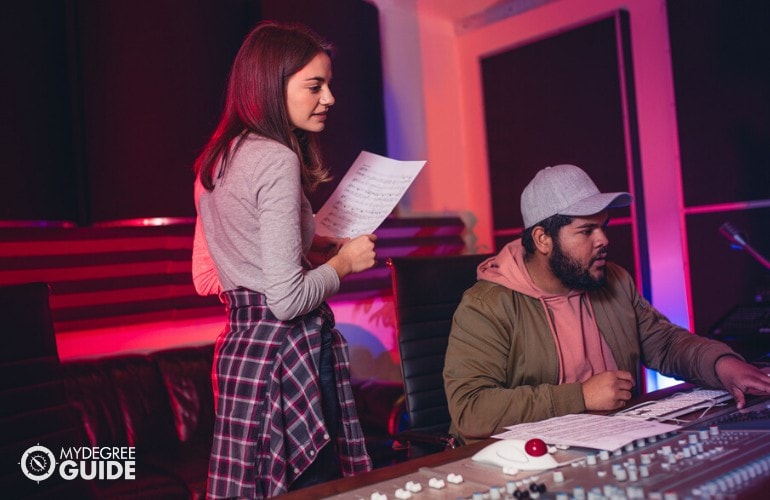
If you are looking to start a career in the music industry, an online music business degree may be a great option for you. This degree is designed to help students learn the ins and outs of the business of music, helping them prepare for a variety of careers including artist management, publishing, booking, concert and artist promotion, and label supervising.
You will likely take courses on several facets of the music industry, including licensing, concert touring, finance, legal issues, and entrepreneurship. You may also take courses on music theory, keyboard, harmony, and ear training.
Editorial Listing ShortCode:
Overall, this degree can help give you the credentials needed to succeed in the industry, knowledge of how this industry operates, and the skills needed to succeed in this complex, evolving, and unique field.
Bachelor’s in Music Composition Online
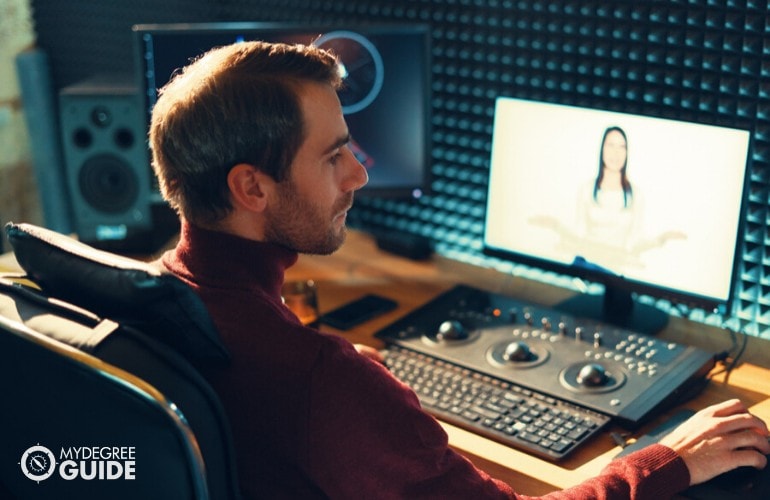
Many Bachelor’s in Music Composition online programs help students learn about the music composition process, but some programs also focus on how to mix audio for media like film, TV, and video games.
As you might expect, the curriculum for a Bachelor’s in Music Composition involves taking many courses on music theory, but you may also take classes focused on technology and its relationship to music.
Editorial Listing ShortCode:
This can help you become well prepared to compose, orchestrate, record, and mix audio for a variety of media. Some programs offer such hands-on experience that you will have a substantial portfolio of work to take with you into the job market.
Bachelor’s in Music Production Online
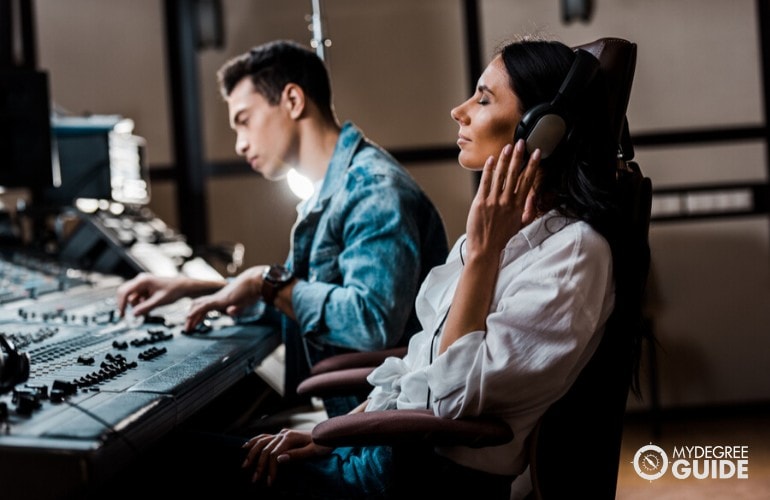
An online music production degree program is designed to help students gain skills in recording, editing, and mixing music. In addition to more traditional music courses, students often take courses like audio fundamentals, critical listening, music production analysis, and microphone techniques.
You may pursue a variety of music styles in your studies, and your program may allow you to take more specialized courses depending on your career goals.
Editorial Listing ShortCode:
Speaking of careers, a Bachelor’s in Music Production can help prepare you for a career as a music producer or sound technician, in addition to the many engineering roles in music, such as a recording engineer, live sound engineer, or mix engineer.
Bachelor’s in Music Studies Online
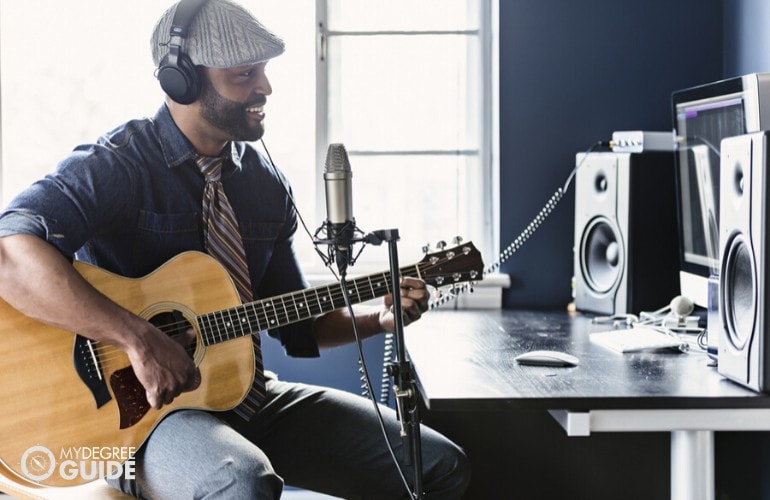
Among the online music degrees, this is the most generalized option designed to give you the flexibility to explore your passions and career interests. You will likely take music courses such as composition, theory, and harmony, along with courses in music production, technology, and business.
Editorial Listing ShortCode:
This type of program can help you build your skills as a musician in a multitude of areas and challenge you to think creatively about your educational experience and career path.
Bachelor’s in Songwriting Online

An online Bachelor’s Degree in Songwriting program can give you opportunities to develop and hone your craft as a songwriter. This type of program is designed to allow students to spend time developing their skills in each aspect of the songwriting process, from harmony and melody to song structure and lyrics.
You will likely take many courses that can be invaluable to developing your writing process, including courses on harmony, melody, lyric writing, songwriting, and collaborative songwriting.
Editorial Listing ShortCode:
In a great Bachelor’s in Songwriting program, students graduate not only with the knowledge and skills of professional songwriters but with highly polished portfolios to back them up.
Bachelor’s in Worship Studies Online

An online Bachelor’s Degree in Worship Studies can help you learn how to enhance worship through music. The courses in this type of program focus on the different approaches to worship and best practices for using music to bring a community together for a higher purpose.
Editorial Listing ShortCode:
Courses focus on leadership and the principles, history, and philosophy surrounding worship. With this degree, you may pursue a career as a church music director, pastor, music minister, or worship leader.
Bachelors in Music Careers & Salaries
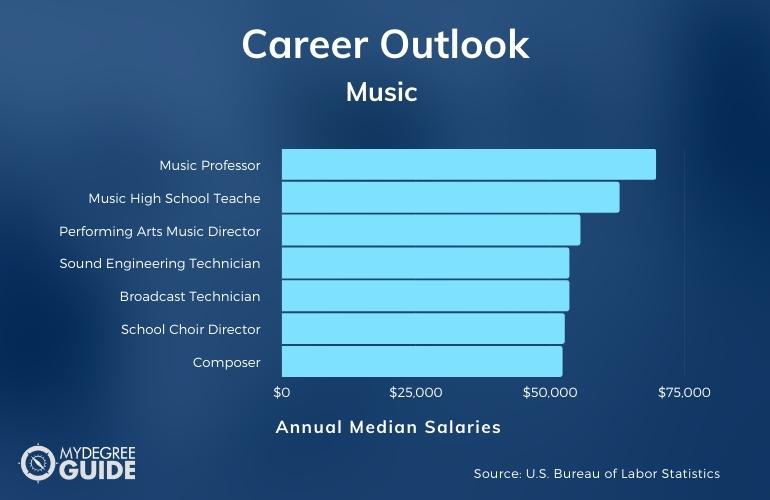
While most Bachelor’s Degree can help open doors to interesting and fulfilling careers, there are many opportunities for those who specifically want to work with music.
You might choose to pass on your love for and knowledge of music as an educator, or you might work more directly in the music industry as a musician, songwriter, music director, music producer, or audio engineer.
A degree in music might also lead to such a career as a Broadcast and Sound Engineering Technician, which the Bureau of Labor Statistics projects will have a 9% change in growth (much faster than average) through the next ten years.
There are many careers for professionals holding a Bachelor’s Degree in Music. Here are some of the most common careers and their average salaries:
| Careers | Annual Median Salary |
| Music Professor | $69,690 |
| Music High School Teacher | $62,870 |
| Performing Arts Music Director | $55,580 |
| Sound Engineering Technician | $53,520 |
| Broadcast Technician | $53,520 |
| School Choir Director | $52,660 |
| Composer | $52,250 |
| Multimedia Production Assistant | $47,920 |
| Music Minister | $45,540 |
| Television Audio Technician | $40,430 |
There are many fulfilling careers available to those who hold a Bachelor’s Degree in Music. Your career can benefit from a Bachelor’s Degree in a variety of fields, but a specialized program in which you can pursue your passions and hone your skills can be special opportunity that may benefit you both personally and professionally.
Online Bachelor of Music Curriculum & Courses

Even though there are a wide range of specializations you could pursue while in a Bachelor’s Degree in Music program, there are many courses that most students take.
Editorial Listing ShortCode:
Here are some examples of courses you may take while enrolled at an online music college:
- Music Business: An introductory Music Business course focuses on taking a broad look at the music industry as a whole, examining how the different facets of the industry operate.
- Music Foundations: This course focuses on the essential aspects of music, regardless of your instrument, particularly harmony and ear training.
- Basic Ear Training: This course can help you as a musician and performer, taking a deep dive into notes, harmonies, and rhythms.
- Legal Aspects of the Music Industry: This course examines the legalities surrounding music and is often invaluable to anyone attempting to break into the industry.
- Artist Management: This course explores the various roles of an artist manager, the manager-artist relationship, the challenges a manager may encounter, and the leadership qualities that constitute an excellent manager.
- Art of Mixing: This course explores all of the facets and steps to the audio mixing process, and the impact that a quality audio mix will have on a piece of music.
- Vocal Production: This course focuses on every aspect of producing the vocals for a song, from pre-production to recording to post-production, along with examining the importance and impact of vocals to a song.
- Lyric Writing: Courses in lyric writing can help you hone your craft as a songwriter by focusing on techniques to generate lyrical ideas, express them effectively, and generate them into a captivating piece of music.
- Harmony: This course focuses on how harmony works and how to recognize and use effective chord progressions in music.
- Music Theory and Composition: A basic music theory course focuses on music fundamentals and will dive into scales, chords, and major and minor keys.
Courses like these are often fascinating and can help you develop invaluable skills and knowledge about the music industry and the art of music.
Admissions Requirements

All colleges and universities will have an application that you must complete to be considered for admission, which may include a statement on your educational and career goals and how your chosen program will allow you to reach your objective.
Often, letters of recommendation (either academic, professional, or personal) and SAT or ACT scores may be required, along with your official transcripts from high school (or equivalent credential) or any colleges or universities you may have attended previously.
Finally, your program of choice may also ask you to demonstrate your skills in music, either through an audition or a portfolio of work.
Accreditation
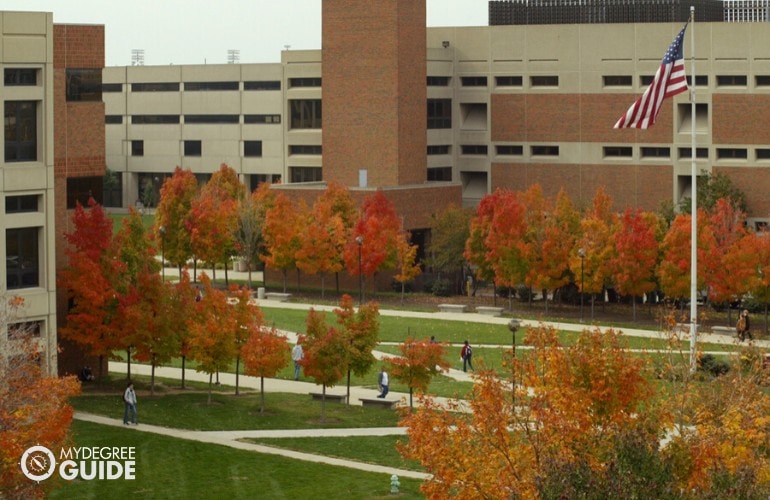
Accreditation is an incredibly important component of evaluating the strength of an online music program.
Accrediting agencies evaluate the academic quality and rigor of institutions of higher education and ensure that they are constantly engaged in improving their programs and services to meet the needs of their students.
Not only does accreditation from a regional accrediting body qualify the institution to distribute federal financial aid to its students, it also serves as a barometer for other institutions of higher education or employers when evaluating the validity of your degree.
Look for the accreditation status by a regional accrediting organization on your chosen college or university’s website.
Financial Aid and Scholarships

How you will fund your education is important to consider when planning your educational path. Fortunately, there are many sources of aid for students, including financial aid through your state or the federal government.
Depending on your income and other factors, financial aid may include student loans (which need to be paid back) or grants and scholarships (which do not need to be paid back). Federal grants include PELL or the Federal Supplemental Educational Opportunity Grant.
Editorial Listing ShortCode:
Scholarships are a source of aid that many students overlook. Your college and university may have scholarships available, so it’s a good idea to inquire about their scholarship application.
Scholarships are awarded based on a wide range of criteria, so don’t exclude yourself because of your own perception of your abilities or financial need. You might be surprised and earn yourself a scholarship!
What Can You Do With a Music Degree?

There are myriads of careers you may pursue with a degree in music. From music producer to educator, from artist manager to band director, there are a multitude of options to suit the skills and passions of someone holding a Bachelor’s Degree in Music.
The Bureau of Labor Statistics shows that job outlook varies in this field. While a Broadcast and Sound Engineering Technician is projected to enjoy a 9% job growth for the next ten years, the job growth for musicians and singers is only projected to be 1% (slower than average).
How Long Does it Take to Get an Online Music Degree?
How long it takes to complete your degree is based on your college or university’s academic calendar, along with how many courses you are prepared to take each semester.
If you follow a traditional, 16-week semester attending full-time, it will likely take you four years to complete. However, if you follow an 8-week semester and take courses continuously year-round, it’s possible to finish in less time.
If you ever consider getting a masters degree in music such as an online masters in music education, then you should plan on being in school for about an extra two years on top of your bachelors degree.
Are There Any Affordable Online Music Degrees?
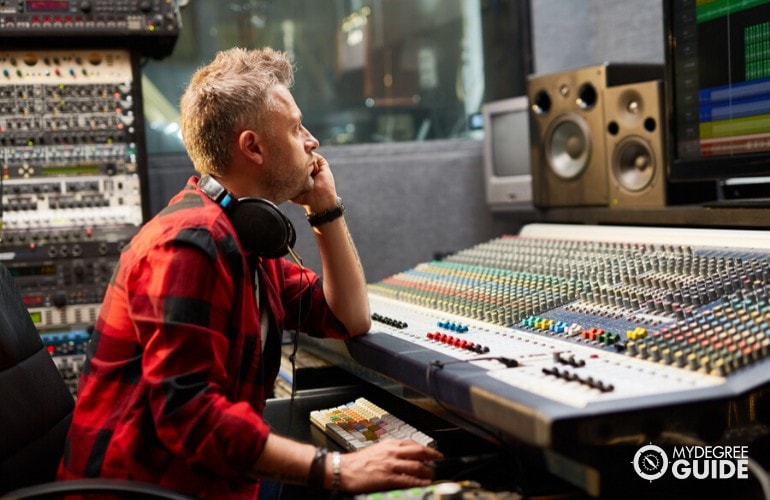
Although tuition rates vary, you can expect to pay approximately $390-$499 per credit in addition to fees.
As mentioned above, there are many financial aid opportunities available that may make pursuing an online degree in music a possibility for you.
Is a Music Degree Worth It?
Yes, a Music Degree is worth it for many students. The Bureau of Labor Statistics is projecting 4% job growth in media and communication occupations over the next 10 years. Common music careers in this field include music producer, artist manager, music teacher, music therapist, and sound designer.
While every job has its challenges, a career in the music industry can have many benefits. Honing your craft and exploring your passions within your career may be a rewarding experience, and jobs are likely to be exciting rather than monotonous.
Universities Offering Online Bachelor’s in Music Degree Program
Methodology: The following school list is in alphabetical order. To be included, a college or university must be regionally accredited and offer degree programs online or in a hybrid format.

The Academy of Art University’s online program offers students the rigor of an in-class music education with a flexible schedule. Students are encouraged to develop their own style while mastering the fundamentals of music theory, composition, and sound design. Alumni have composed music for Dreamworks, Apple, and other industry leaders.
Academy of Art University is accredited by the WASC Senior College and University Commission.

Baptist College of Florida’s Bachelor of Arts in music is designed to train students in music composition, analysis, and performance. All students enroll in an ensemble and private lessons each semester to practice and master their musical skills alongside the theories they learn.
The Baptist College of Florida is accredited by the Southern Association of Colleges and Schools Commission on Colleges.

Berklee’s online bachelor’s degree program offers the renowned Berklee curriculum at less than half the in-person cost. Students have access to an award-winning faculty while being able to customize their schedule from home. Students choose a concentration or create their own major as they focus their music education journey.
Berklee Online is accredited by the New England Commission of Higher Education.

The goal of Cedarville University’s Bachelor in Worship program is to educate students in music performance and theory alongside theology, multimedia, and leadership skills.
Students have the ability to tour with Cedarville’s worship ensemble to gain performance experience on the road. This program aims to prepare graduates to be inspiring ministers and community leaders.
Cedarville University is accredited by the Higher Learning Commission.

At Grand Canyon University, the Bachelor of Arts emphasis in Worship Leadership is designed to bestow skills in public speaking alongside study of the Bible and music and multimedia practices. Online students design their schedules around their busy lives while receiving an education that can help them become mission, worship, and community leaders.
GCU is accredited by the Higher Learning Commission.

Judson College’s Bachelor of Arts in Music offers a rich theoretical foundation paired with a performance focus. Judson’s faculty is composed entirely of PhD recipients. Students have the option to minor in either music or church music to round out their bachelor degree.
Judson College is accredited by the Southern Association of Colleges and Schools Commission on Colleges.

Juilliard’s online bachelor in music offers a once-in-a-lifetime musical experience. In ensemble, chamber music, and private lessons, students can study the tradition of music performance, theory, and composition with a renowned faculty.
Students have the chance to work with Juilliard’s dance and acting schools for an interdisciplinary approach to fine art.
The Juilliard School is accredited by the Middle States Commission on Higher Education.

Liberty University’s online bachelor’s degree in worship studies offers an educational opportunity for current ministers or students to formalize their worship expertise. The goal of this program is to help students learn a solid foundation of community building, conducting, and music theory in order to join the next generation of performers and ministry leaders.
Liberty University is accredited by the Southern Association of Colleges and Schools Commission on Colleges.

Shorter University’s Bachelor of Music in Worship and Music Leadership is designed to provide a combination of tradition, knowledge, and practical application of skills. Students can learn to lead worship through a variety of instruments as well as in the role of conductor, service planner, and producer.
Shorter University is accredited by the Commission on Colleges of the Southern Association of Colleges and Schools Commission on Colleges.

SUM Bible College’s Bachelor of Arts in Worship and Music focuses the study of Christian theology through worship service. Students are given opportunities to learn traditional and contemporary styles of worship, how to lead a community, and develop proficiency on varying instruments. Students can also gain ministry experience in a practical mentorship program.
SUM Bible College and Theological Seminary is accredited by the WASC Senior College and University Commission.

SUNY Empire State College’s online bachelor’s degree in the arts is designed to give students the proficient skills and critical thinking tools to focus their inspiration into highly crafted pieces of art. A faculty mentor creates a curriculum to focus on students’ individual objectives while building a foundation of theory and application.
SUNY Empire State College is accredited by the Middle States Commission on Higher Education.

Texas State University’s Bachelor of Arts in Music is designed to prepare students for a variety of careers including performance, music therapy, business, and more. In addition to core classes, students take a variety of music and musicianship classes related to theory, performance, design, and composition.
Texas State University is accredited by the Commission on Colleges of the Southern Association of Colleges and Schools.

The University of Maine at Augusta’s Contemporary and Popular Music program presents a fresh take on a musical education. With a low student-to-teacher ratio, students focus on contemporary and jazz styles in their primary instrument while developing a foundation in theory, history, and business.
The University of Maine at Augusta is accredited by the New England Commission of Higher Education.

The University of Michigan at Flint offers a comprehensive Bachelor of Arts in Music degree. This music concentration in the Bachelor of Arts program provides a musical education on top of the curriculum of a liberal arts education. Performance, theory, and composition are all covered in these challenging, creativity-driven courses.
University of Michigan-Flint is accredited by the Higher Learning Commission.
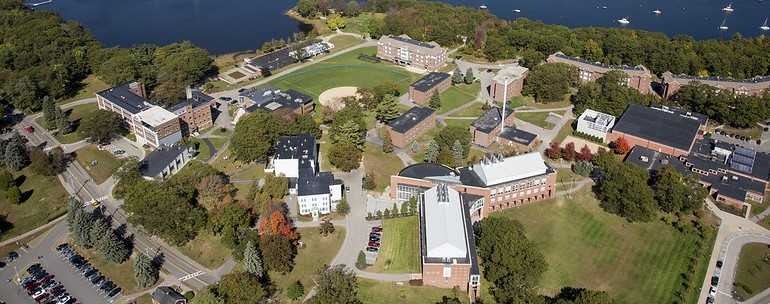
At the University of New England’s Bachelor of Music program, students’ creativity is encouraged as they receive an advanced musical education. Students are expected to develop a creative portfolio as they compose, perform, and study music theory and history. The opportunity is available to take an honors year, capped with a dissertation.
The University of New England is accredited by the New England Association of Schools and Colleges.

The University of Rochester’s Bachelor of Music Degree applies theory and application to challenge students to succeed. Students can compose and perform while receiving the rounded education expected of a BM Degree. Rochester works with the Eastman Institute for Music Leadership for students who seek careers in leadership and art business.
The University of Rochester is accredited by the Middle States Commission on Higher Education.
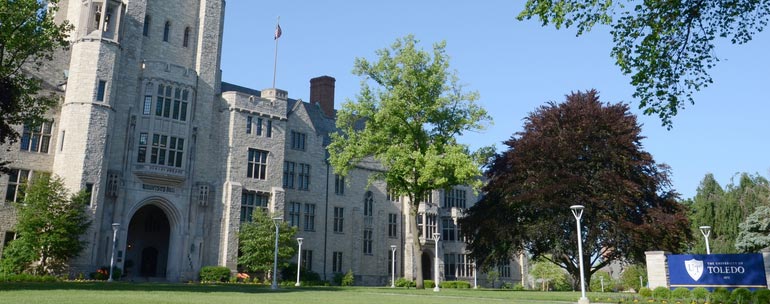
The University of Toledo’s Bachelor of Arts in Music balances humanities with music studies. The program is designed to create a foundation of knowledge through student-focused seminars, while students develop a concentration to work on their individual careers and creative goals. This education is finalized with a Senior Thesis which rounds off the concentration.
The University of Toledo is accredited by the Higher Learning Commission.

The University of West Georgia’s Bachelor of Music focuses on aspiring composers and music scholars. In addition to a wide range of music classes and seminars, students may attend concerts, recitals, performances, and workshops with visiting faculty and musicians. This NASM accredited university offers a renowned major in music composition.
UWG is accredited by the Southern Association of Colleges and Schools Commission on Colleges.

Valley City State University offers a Bachelor of Arts with a Music Major. This concentration allows creative-minded students to study and perform music in addition to their liberal arts core classes. Students have the opportunity to join one of many music performance groups for practical application of their studies.
Valley City State University is accredited by the Higher Learning Commission of the North Central Association of Colleges and Schools.

Washington State University offers an online humanities degree with a Music concentration. This liberal arts degree is designed to prepare students for critical thinking, leadership, and creative skills to succeed in any field.
The musical foundation of theory, history, and composition is balanced with opportunities for performance to round out the concentration.
WSU is accredited by the Northwest Commission on Colleges and Universities.
Getting Your Music Degree Online

If you’re interested in breaking into the music industry, pursuing a Bachelor’s Degree in Music may be an excellent way to learn about the music business, develop your music skills, and discover the direction you want your career to take.
If you work full time or there isn’t a college or university offering this degree near you, online music programs offer a convenient solution. Accredited universities with this online degree can be your jumping off point into a fulfilling educational experience and an invigorating career.
The courses you will take and the people you will meet should be fascinating, but not nearly as captivating as your own personal journey and discovery process.

